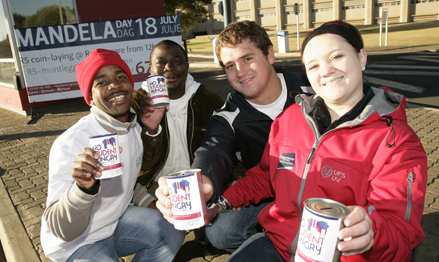|
 |
|
Photo: Johann Roux
08 July 2013 |
The University of the Free State (UFS) will once again join South Africans as well as the broader international community on Thursday 18 July 2013 in celebration of the enduring legacy of beloved former statesman, Nelson Mandela.
The UFS aims to stay true to the spirit of giving and selflessness epitomised by Mandela Day, focusing on the university community as well as the city of Bloemfontein.
This year’s event will strive to eclipse the success achieved during the 2012 event which featured Archbishop Emeritus Desmond Tutu as special guest.
The festivities on 18 July 2013 will kick off with university volunteers cleaning various areas of Bloemfontein. Departing from the Bloemfontein Campus at 09:00, the volunteers will clean areas in Heidedal and Mangaung with the help of the Mangaung Metropolitan Municipality.
In Heidedal, the volunteers will clean the crèche on the corner of Parish and Lackay roads as well as the old clinic on the corner of Parish and De Vries. In Mangaung, the volunteers will tackle the bustling Free Square on the Dewetsdorp road.
The larger celebration will take place on the Red Square of the Bloemfontein Campus at 12:00. Long-time Madiba confidant, Zelda la Grange, will deliver a message, followed by a R5 coin-laying ceremony.
La Grange will be joined by the motorcycle riders affiliated to the Bikers for Nelson Mandela Day, OFM presenter Johrné van Huysteen who will conduct proceedings, UFS Vice-Chancellor and Rector Prof Jonathan Jansen as well as UFS students, staff, other dignitaries and special guests.
The programme also includes a lucky draw with winners standing the chance to win restored bicycles. Tickets can be purchased through Annelize Visagie at 051 401 3258 or at visagiea@ufs.ac.za. The winners will be announced during the ceremony on the Red Square.
All proceeds of the coin-laying ceremony and lucky draw will be contributed towards the university’s No Student Hungry (NSH) Programme.
The NSH Programme was established in 2011 to help ensure needy students are supplied with a food bursary which provides them with the necessary nourishment to excel in their academic studies. The initiative has since become a university-wide endeavour and currently serves more than 100 students daily on the Bloemfontein and Qwaqwa Campuses.
Rag Community Service will also cater for the specific needs which the harsh Free State winter causes – especially to the poor. Close to 500 blankets will be donated on Mandela Day to five different charities, including Mosamaria Aids Ministry, Choc House and Freshly Young Minds.
For further information, please contact Marissa van Jaarsveld on 051 401 3834 or at nostudenthungry@ufs.ac.za.